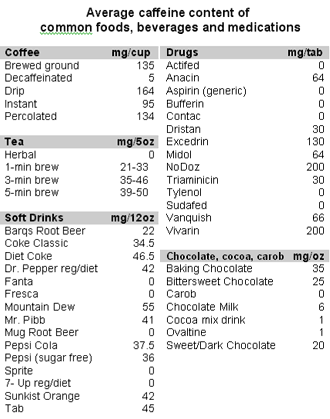There’s nothing like a good ol’ espresso buzz before a morning workout; after all, research shows that caffeine can improve your athletic performance temporarily. But is it GOOD for you? How does it work? We review the evidence.
What is caffeine?
Caffeine is a methylxanthine. Other common methylxanthines include theobromine and theophylline, which are found in cocoa and teas. Methylxanthines act as adenosine receptor blockers and phosphodiesterase inhibitors.
If you have no idea what we just said, here’s some further explanation.
Adenosine acts as the “brakes” in the central nervous system. So when its effects are blocked (by caffeine), stimulation occurs.
Phosphodiesterase is an enzyme necessary for the breakdown of the 2nd messenger protein cAMP within cells. As its “messenger” moniker implies, cAMP helps transfer signals within cells. If this messenger protein is not being broken down (caffeine prevents this breakdown), it will have a better opportunity to cause its stimulatory effects.
In other words, caffeine prevents the body from slowing things down at a cellular level.
Why is caffeine so important?
Caffeine is the most widely consumed stimulant in the world and occurs naturally among several plants such as coffee bean, kola nut, tea leaf, and cacao seed.
Considered a drug, caffeine is one of the most highly studied ergogenic aids.
Caffeine can decrease fatigue and increase mental alertness as a result of stimulating the brain. However, high doses of caffeine can produce anxiety and tremors.
Caffeine also increases the force and rate of the heart. Along with its derivatives, it can also relax the airways, which allows for increased oxygen consumption.
Wakefulness is probably the most common manifestation of caffeine consumption.
It’s important to note that caffeine consumption can increase the adverse effects of stimulant drugs such as amphetamines, methylphenidate (Ritalin, Concerta), and theophylline, causing nervousness, tremor, and insomnia. It can even counteract the anti-anxiety effects of medications like lorazepam.
Caffeine can increase the mobilization of fatty acids as a fuel during exercise. That’s one of the reasons caffeine consumption is popular among physique athletes.
What you should know
The good
Caffeine can increase performance, especially with endurance events. Athletes can typically last longer and work harder. But even brief bouts of activity can be improved with caffeine use. This may be due to increased alertness and awareness. Indeed, caffeine can be addictive for many athletes because of these performance benefits.
The bad
Caffeine consumption can decrease the effectiveness of serotonin and trigger the release of dopamine (two major neurotransmitters), which can make it even more addictive.
When someone nixes the caffeine from their daily routine, the adenosine accumulation is substantial, and without the blockade from caffeine, adenosine is free to exert its effects. The over-abundance can cause vasodilation (headaches), shakiness and stomach upset, which are all classic symptoms of caffeine withdrawal.
If caffeine is used regularly and at the end of the day, people may have trouble getting to sleep and sleeping well. Because sleep quality and duration affect the hormones that control appetite, hunger and satiety along with anabolism/catabolism, caffeine can ultimately detract from optimal body composition and performance despite its temporary enhancement.
Caffeine has effects on the gastrointestinal tract. It increases the production of stomach acid, with large amounts inducing stomach upset or acid reflux.
The ugly
While caffeine can improve athletic performance, it can also send you rushing to the restroom. It was long believed that caffeine acted as a potent diuretic. However, recent studies have disproved this hypothesis. Caffeine can, however, irritate the bladder and increase urinary urgency. Because of caffeine’s effect on the GI tract, it can also stimulate diarrhea.
It’s possible to build up a tolerance to caffeine. More caffeine may be needed over time to get the same stimulation.
While many studies indicate that caffeine can enhance performance, many studies also suggest it has no effects. It seems that a large individual variation exists.

For extra credit
- More than 400 mg of caffeine per day can result in anxiety and irritability.
- If trying to decrease daily caffeine consumption, do so in increments.
- Urinary caffeine levels above 12 mcg/ml are considered “doping.” This level is easily reached by 8 cups of coffee.
- 300-400 mg of caffeine intake increases urinary calcium excretion.
- Caffeine intake seems to increase the risk of first trimester spontaneous abortions.
Interestingly, new research out of the University of Toronto is starting to explain why caffeine seems to have such opposing effects in different research studies.
Researcher Ahmed El-Sohemy and his team found that there are genetic variations in caffeine metabolism, which in the case of his research led to different heart disease outcomes.
Summary and recommendations
- 3-5 mg of caffeine per kilogram of bodyweight can provide a performance effect without health risks. At 3 mg/kg, an 80 kg person would need 240 mg of caffeine.
- If using caffeine to increase performance, try consuming it 30 to 60 minutes before the event/exercise. Blood levels of caffeine are maximized about 60 minutes after consumption, but effects are noticed by 30 minutes.
- Try to use caffeine when you actually “need it.” Repeated caffeine consumption can create a tolerance and lessen the benefit.
- Take caution if you plan on mixing caffeine with other supplements. Using multiple stimulants (e.g., synephrine, ephedra, forskolin, yohimbe, etc.) can put one at risk for sudden arrhythmic death.
References
Click here to view the information sources referenced in this article.
Learn more
Want to get in the best shape of your life, and stay that way for good? Check out the following 5-day body transformation courses.
The best part? They're totally free.
To check out the free courses, just click one of the links below.




Share